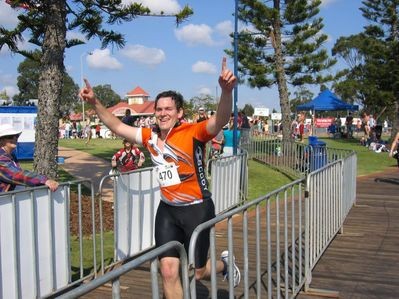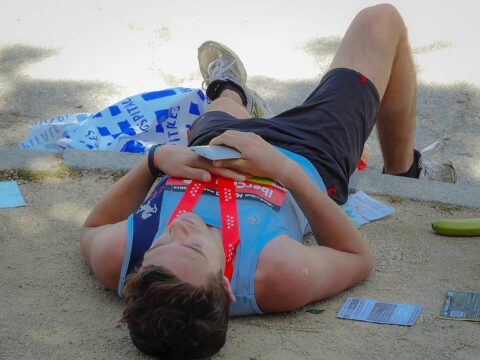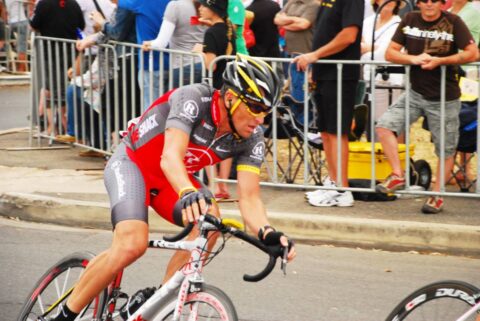
Sometimes, in order to survive as a triathlete, you’ve got to break the rules.
Let’s begin by stating the obvious, which is often the first thing we lose sight of on the journey: Training and competing in triathlons is something you chose to do.
Whatever circumstances and motivations led to becoming a triathlete, it’s something you voluntarily chose to get into. No one is making you train and compete in triathlons. There is no gun to your head demanding you sign up for the Florida Challenge Triathlon. Right now, you could pull the plug on the entire triathlon thing if you wanted.
Your motivation for doing triathlons was likely a very positive one, and perhaps it was all worthwhile and inspiring at first. But now it’s a routine — day after day after day after day of the same old thing. Swim, bike, run, repeat. Lift weights, stretch, repeat. Eat carbs, eat protein, drink water, repeat. Ice shoulder, apply IB Relief cream to feet, use heat pack on lower back, repeat. Rise early in the morning, check off another demanding training session, work, start fading around 7:30 p.m., repeat; oh yeah, do extra on the weekends.
You may be suffering with a severe case of the triathlon doldrums if you have any of the following signs…
- Your blood pressure spikes when someone in the gym starts using a piece of equipment you were headed over to use.
- Your whole day is ruined because someone asks if they can share your swim lane at the pool.
- You start praying for severe storms or tornadoes to supply a justifiable reason for missing your planned biking session.
- You have repeated dreams about eating greasy hamburgers and DQ Blizzards.
- You daydream about new hobbies such as bird watching, scrapbooking or stamp collecting.
Okay, it’s time to free yourself from your triathlon prison and put a little fun back into your life as a triathlete.
In order to do that, you may have to break one of the seldom-questioned “givens” of triathlon training, namely that triathlon training is a science.
Triathlon Training Is Not A Science
Here’s how it goes…
That’s right, somewhere underground in Arizona is the International Triathlon Science Center, where people in lab coats are analyzing beakers filled with chemical compounds and converting the results into specially designed principles and plans for improving one’s level of fitness and performance as a triathlete.
What fool would disregard the objective and irrefutable laws of tri-science these geniuses with MIT degrees produce? Okay, I know I’m going a bit overboard here, but I think you get my point that sometimes we triathletes can get a little too carried away with whatever we’re told that hints of achieving higher levels of performance.
The gurus say triathlon training is a science. The problem is, I always hated science. Geessh, does everything in life have to be reduced to a fill-in-the-blank and check-the-box log? Sometimes it feels like every little detail of my triathlon training sessions are predetermined, and I’m just some droid slavishly obeying the plan: do this workout on Monday, do this workout on Tuesday, etc., just shut up and do it! The tri gods in the sky are watching and waiting to curse you if you don’t stick with the plan.
There’s More Than One Way

By now, you’ve probably figured out that a predetermined triathlon training plan and calendar doesn’t always square with real life.
Here’s what often happens to a triathlon training calendar or schedule:
- Saturday is supposed to be a 2-hour run, but you’re trashed because you were up all Friday night with sick kids.
- Monday is supposed to be a light day with a 15-minute recovery swim, but you feel like you could keep going for another 30 minutes or more and you’d be fine.
- Wednesday, a 50-mile bike ride is scheduled, but 20 miles into it that chest congestion flares up again and turns into a nasty cough.
- Sunday was meant to be a run day, but Saturday night a friend calls to invite you to join his triathlon club for a bike ride.
When these things happen, stress and anxiety fills the triathlete because they have the plan.
The Truth About Training Plans
The truth is that, in some cases, even the people who create the plans and promote the plans never followed and don’t follow such plans themselves.
Sometimes a training plan can lead to significant problems.
When it is too demanding, a triathlete can easily dig themselves into a hole towards injury or burnout. When compulsively following a pre-programmed plan, a triathlete is tempted to ignore the feedback their body is giving them. This means that when the first signs of an injury are evident, the plan-following droid triathlete may keep training until that injury significantly worsens.
Do you get the picture of what the life of some triathletes becomes?
They enter the sport with enthusiasm and excitement, inspired by new dreams and goals, but then they become triathlon slaves, following the plan like droids in order to appease the tri gods. They walk around filled with guilt and anxiety, and are continuously on the brink of burnout and injury — all in the name of science.
Training Is More Of An Art Than A Science

Maybe it’s time to free yourself from the shackles of the plan and begin thinking of triathlon training as more an art than a science.
I’m assuming you are a triathlete who has a good working knowledge of the foundational components of triathlon training such as year-round training and the principle of periodization.
Here’s how to experiment with a more creative and freer approach in your training:
1. Listen to your feelings.
Consider your feelings related to the sport of triathlon a significant factor of your long-term success. Let’s face it, most people are not going to continue an interest as demanding as triathlon if they are in a chronic state of anxiety and misery as a result of it.
“Just push through it” isn’t an answer that solves this. There’s a difference between the sport being hard and demanding; we all know that triathlon isn’t for the weak at heart. But when feelings of dread, anxiety or deadness are commonplace, these are signs that something needs to change.
2. Personalize your plan.
There is no one-size-fits-all triathlon training plan.
A pre-made plan from a book or off the Internet doesn’t take into account the many different variables that make you a unique triathlete. Your strengths and weaknesses, your age, your current level of fitness, your personality, your lifestyle and income, your unique health needs or challenges. These are all factors that contribute to crafting a triathlon training plan that’s right for you.
As a starting point, ask yourself this question:
What are the 3 most significant and unique things about me as a triathlete, and how would this impact my triathlon training plan?
Many triathletes forge a partnership with a triathlon coach to develop a more personalized approach to training. A good triathlon coach will help you design a plan that meets your unique needs and desires.
3. Prioritize your training sessions.
If you’d like more freedom in your triathlon training plan, determine your weekly volume or mileage goals for each endurance discipline and your strength and stretch needs.
For each week, design and identify a couple “breakthrough sessions” where you stick with the plan and give it your all-out best and most focused effort. Examples of a breakthrough session might be:
- a long run, swim or ride
- a threshold-type high intensity training session
- a “brick” session where you are combining 2 of the disciplines together — a swim/bike or a bike/run.
Get the remainder of your volume or mileage in for the week however and whenever you choose in low- to medium-intensity level sessions as needed.
4. Incorporate “wellness rewards” into your weekly training.
A wellness reward is a non-training component designed to improve your overall enjoyment and performance as a triathlete.
They are things we typically don’t think of in terms of sticking with them with the same level of discipline as our training commitments. You can create your own wellness rewards but try to incorporate one each week.
Some wellness reward examples would be:
- Getting a massage
- Sleeping in
- A dessert splurge
- A coffeehouse visit for java and reading an inspiring book. I really enjoyed It’s Not About the Bike and Ultramarathon Man.
Of course there are sound principles to endurance sports training that would be wise to follow. In this sense, there is a “science” component to what we know about improving our level of fitness and performance as a triathlete.
Making it into an art is a matter of utilizing those key principles with a little more freedom, creativity, and personalization.
So, it’s time to break out of your triathlon doldrums. To get you going, download this tune on your iPod and listen to it today as you spin or run.
I’m over 40 years old, but I don’t give up easily. It wasn’t too long ago that I was exploring the idea of doing my first triathlon. If I can do it, you can too! I'm proof that with a little determination and training, you can get a great deal of fulfillment participating in marathons, triathlons… even ultramarathons.








